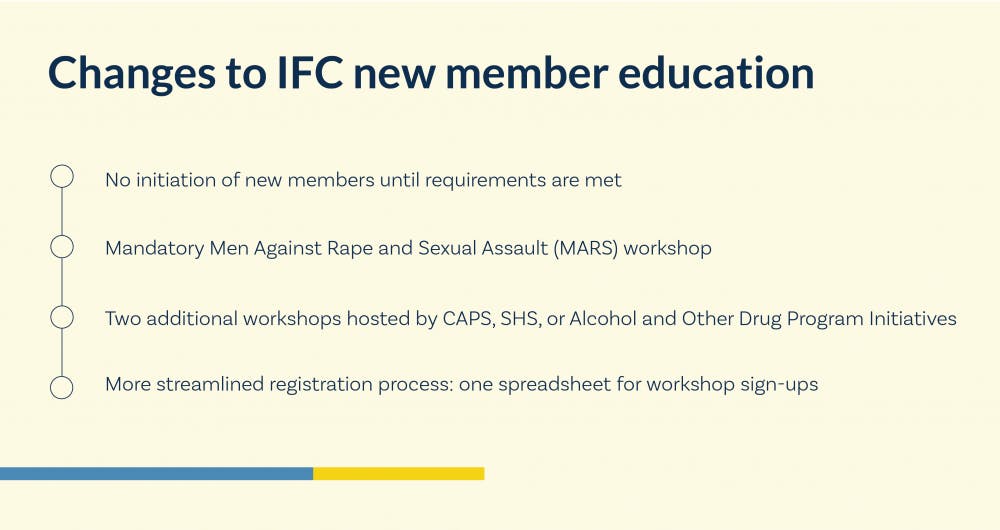
Brian Schmitt (left), Danny Leiser (middle), and James Hiebert (right) explain the need for fraternity members to attend New Member Education.
Credit: Eric ZengAfter years of low turnout among fraternity members at educational programs, Penn's Interfraternity Council will bar fraternity chapters from officially initiating new members until New Member Education requirements are fulfilled. The IFC also adjusted requirements and fine-tuned the sign-up process for its NME programs.
The six-week NME process, which began this year on Jan. 28, consists of workshops on sexual and mental health that new members must attend before being officially initiated into their fraternities. The Men Against Rape and Sexual Assault workshop was mandatory for all new members this year, which is a change from last year's policy, where MARS was one of nine events offered, from which fraternities had to choose three to attend. In 2017, the MARS workshop was required for everyone.
Out of the workshops hosted by Counseling and Psychological Services, Student Health Services, and Alcohol and Other Drug Program Initiatives, fraternities must also choose two additional workshops for all new members to attend.
Although IFC sets clear attendance requirements each year, it has historically struggled to get fraternities at Penn to comply. Last year, the IFC tried to combat poor attendance by softening the rules, allowing chapters to pick which events they wanted to attend to satisfy the three total required of them. The previous year, the IFC took a firmer stance, publicly releasing the attendance rates of the fraternities that did not satisfy the requirements. The IFC also theoretically could impose a fine and require chapters to schedule make-up workshops. Only five out of 27 fraternities managed to meet the NME attendance requirements in 2017.
This year, the IFC is taking a harsher stance in threatening to bar new members from being officially initiated and reinstating requirements, but has streamlined the sign-up process.

A structural change this year includes collaboration with Student Wellness Services, which did not exist during last year's NME process, said College senior James Hiebert, who is also the president of MARS. Now, fraternities will have a more streamlined process of registering for the workshops because all the host organizations fall under the Student Wellness Services umbrella.
Each fraternity now enters the workshops they want to sign up for on one shared spreadsheet. This is a change from the previous years when Hiebert said the communication between fraternities and outside organizations such as MARS and CAPS was disorganized.
“At one point, you would email me,” Hiebert said. “At another point, you would go through CAPS’ website.”
Similar to last year, three new members from each fraternity are also required to attend a "health camp" hosted by Campus Health. The total number of workshops stayed the same from last year.
Engineering junior Danny Leiser, who was the 2018 vice president of NME, said the NME will continue to require only three members per fraternity to attend health camp due to scheduling conflicts.
“The timing is difficult more so because it has to be done during the day,” Leiser said. “They pull people from the hospital. They pull people that work for the school that take time off, and it tends to conflict with schedules.”
While the NME process is officially six weeks long, Leiser said the timeline is flexible and that he is willing to extend the deadline for fraternities as long as it's within reason. Hiebert added that MARS also offers a make-up presentation for those who cannot make the first one.
College junior Brian Schmitt, who is the president of IFC, said because make-up workshops are allowed, he expects every fraternity to meet the requirements.
Despite all the logistical changes, Schmitt said what is special about this year’s NME is that the IFC is asking Student Wellness Services staff for help on how to effectively train their new members on wellness.
“It’s an exciting time to be considering what a healthy, well, accountable campus looks like," Hiebert added.
The Daily Pennsylvanian is an independent, student-run newspaper. Please consider making a donation to support the coverage that shapes the University. Your generosity ensures a future of strong journalism at Penn.
Donate







